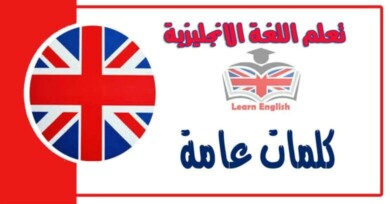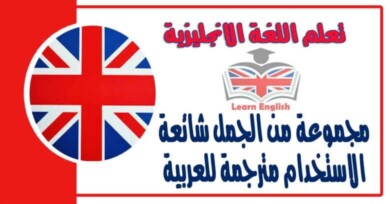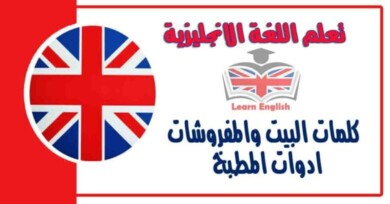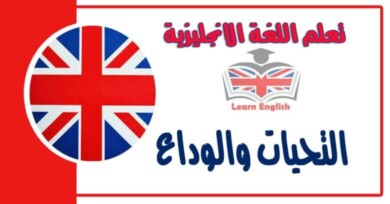جدول المحتويات
الافعال المساعدة والفرق بينهم في اللغة الانجليزية
الأفعال المساعدة The Auxiliary Verbs
فعل الكينونة (to be):
في المضارع:
- I am
- He is
- She is
- It is
- We are
- You are
- They are
– في الماضي:
- I was
- He was
- She was
- It was
- We were
- You were
- They were
استخداماته:
يستخدم كفعل أساسي بمعنى يكون مثل:
- He is a clever boy.
- She was a liar girl.
يستخدم كفعل مساعد في الأزمنة المستمرة مثل:
- He is playing tennis now.
- He was playing tennis when he was a boy.
يستخدم في حالة المبني للمجهول في جميع الأزمنة مثل:
- He was punished for his wrong deeds.
- He has been punished for his wrong deeds.
– يستخدم مع to ليعبر عن ترتيب أو اتفاق مثل:
- He is to leave by the 6 o’clock train.
- We were to go to the cinema last night.
ملحوظة:
الجملة الأولى تعني أنه من المتفق عليه أنه سيرحل، أما الجملة الثانية فتعني أننا رتبنا للذهاب إلى السينما ولكننا لم نذهب.
ب: فعل الملكية (to have):
في المضارع:
- I have
- He has
- She has
- It has
- We have
- You have
- They have
في الماضي:
- I had
- He had
- She had
- It had
- We had
- You had
- They had
استخداماته:
يستخدم كفعل أساسي في الجملة بمعنى يملك مثل:
- I have a car.
- She has a computer.
يستخدم كفعل مساعد في الأزمنة التامة مثل:
- He has lived in Cairo.
- After he had taken the book, he went out.
يستخدم مع to ليعبر عن إلزام أو حدث ضروري مثل:
- He has to go at once.
- I have to go to Cairo now.
فعل (to do):
في المضارع:
- I do
- He does
- She does
- It does
- We do
- You do
- They do
في الماضي:
- I did
- He did
- She did
- It did
- We did
- You did
- They did
استخداماته:
يستخدم كفعل أساسي في الجملة بمعنى يفعل مثل:
- He did his homework yesterday.
- I did all my duties yesterday.
يستخدم كفعل مساعد في حالة النفي مثل:
- He does not like orange juice.
- I do not like liars.
يستخدم كفعل مساعد في حالة الاستفهام مثل:
- Do you know her?
- Does she know the way to Cairo.
يستخدم لتجنب تكرار الفعل مثل:
- He speaks English as well as you do.
- I speak English as well as she does.
لتجنب تكرار فعل “speak” في الجملتين السابقتين، استعضنا عنه باستخدام “do” و “does”.
يستخدم للتأكيد مثل:
- I do think he is right.
- She does think so.
فعل (shall / will):
في المضارع:
- I shall / will
- He will
- She will
- It will
- We shall / will
- You will
- They will
في الماضي:
- I should / would
- He would
- She would
- It would
- We should / would
- You would
- They would
- I shall write to him tomorrow.
- He said that he would visit us.
استخداماته:
يعبر عن حدث في المستقبل
وأحياناً نستخدم ” will” محل ” shall” أو العكس وذلك للتعبير عن معنى معين كما في الأمثلة التالية:
- I will write to you every week. (وعد)
- You shall not go out. (أمر)
- I will punish you if you do not come. (تهديد)
- You tell me not to go but I will. (تصميم)
- فعل يستطيع (can):
في المضارع:
- I can
- He can
- She can
- It can
- We can
- You can
- They can
في الماضي:
- I could
- He could
- She could
- It could
- We could
- You could
- They could
- I can read, write and speak English very well.
- He could not study his lessons yesterday because he was sick.
استخداماته:
للتعبير عن المستقبل نستخدم صيغة will be able to
لا يجوز استخدام can مع فعل know
فعل يجوز (may):
في المضارع:
- I may
- He may
- She may
- It may
- We may
- You may
- They may
في الماضي:
- I might
- He might
- She might
- It might
- We might
- You might
- They might
استخداماته:
يستخدم ليعبر عن غرض مثل:
- I go to school so that I may learn.
يستخدم ليعبر عن احتمال مثل:
- He may (might) come tomorrow
يستخدم ليعبر عن الإذن بالقيام بفعل معين مثل:
- You may go if you like.
فعل يجب (must):
في المضارع:
- I must
- He must
- She must
- It must
- We must
- You must
- They must
في الماضي:
- I had to
- He had to
- She had to
- It had to
- We had to
- You had to
- They had to
استخداماته:
يستخدم للتعبير عن الوجوب أو الإلزام مثل:
- I must go now.
- He had to be polite with me last night.
فعل يجب (ought to):
في المضارع:
- I ought to
- He ought to
- She ought to
- It ought to
- We ought to
- You ought to
- They ought to
في الماضي:
- I ought to
- He ought to
- She ought to
- It ought to
- We ought to
- You ought to
- They ought to
استخداماته:
يستخدم للتعبير عن الوجوب أو الإلزام مثل:
- You ought to start reading at once.
- He told me I ought to do it.
(تعني هذه الجملة أنه نصحني بأن أفعل ذلك في المستقبل)
- He told me I ought to have done it.
(تعني هذه الجملة أنه انتقدني أو لامني لأنني فشلت في القيام بشيء ما في الماضي)
ملاحظات:
يمكن استخدام (will, would, could) للتعبير عن طلب في المضارع أو المستقبل مثل:
- Will (would, could) you type this page for me, please?
يمكن استخدام (would) للتعبير عن عادة في الماضي مثل:
- When I was young girl, I would often go for long walks.
لا يجوز استخدام (might) بمعنى الإذن في حالة الماضي ولكن نستخدم بدلاً منها صيغة (be allowed to) مثل:
- You may go now. He was allowed to go yesterday.
الفرق بين (must, have to, ought to, should, need not):
must تعبر عن إلزام مفروض من جانب المتكلم مثل:
You must clean your boots now.
وتعني الجملة السابقة (أنا أأمرك بتنظيف حذائك الآن وهناك خطورة إن لم تفعل ذلك).
have to تعبر عن إلزام مفروض بواسطة ظروف أو سلطة خارجية وليس من جانب المتكلم مثل:
- You will have to clean your boots when you join the army.
وتعني الجملة السابقة أن تعليمات الجيش تلزمك بتنظيف حذائك.
ought to تعبر عن واجب أو إعطاء نصيحة مثل:
- You ought to clean your boots.
وتعني الجملة السابقة (أنا أذكرك بأهمية تنظيف حذائك).
should تعبر عن واجب أو إعطاء نصيحة وتشبه إلى حد كبير (ought to) مثل:
- You should clean your boots.
need not تعبر عن عدم الإلزام أو من غير الضروري مثل:
- You need not clean your boots as the streets are already muddy.
وتعني الجملة السابقة أنه لا داعي لتنظيف حذائك لأن الشوارع موحلة بالفعل.





